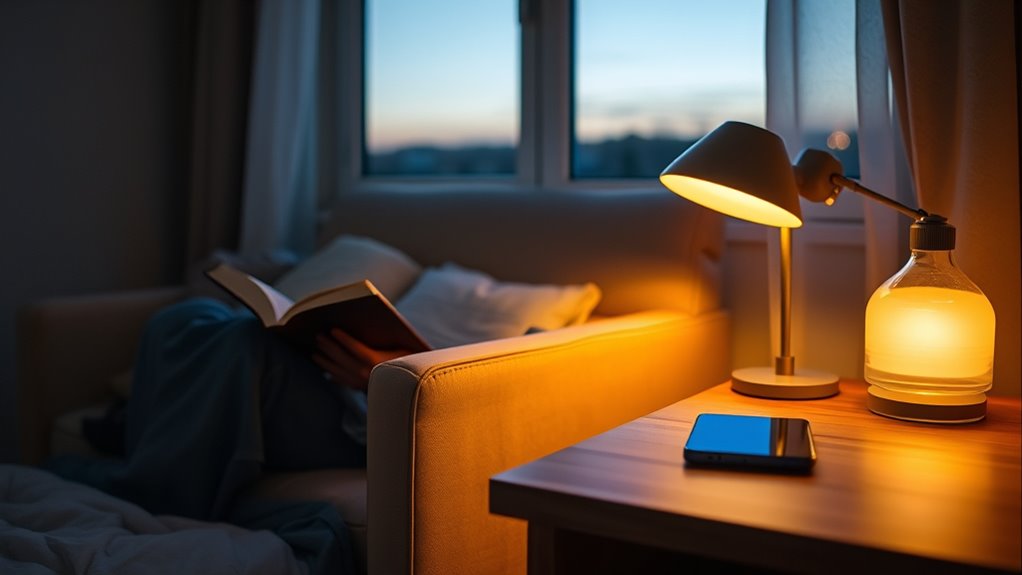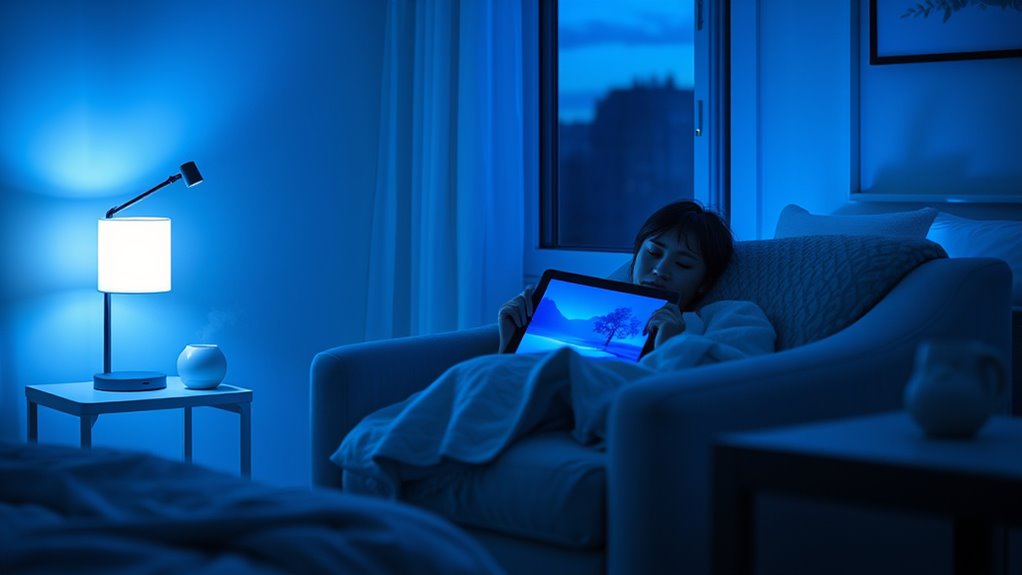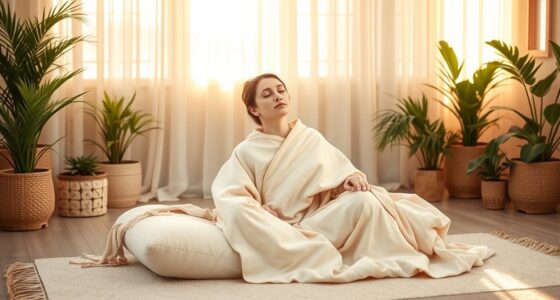To improve your sleep with blue-light hygiene in the evening, turn off screens at least an hour before bed to boost melatonin production. Use blue-light filters or glasses if you need to use devices. Replace screen time with calming activities like reading or listening to music. Creating a dark, cool environment and sticking to a routine can further help. Keep exploring for more strategies to enjoy restful nights and energized mornings.
Key Takeaways
- Turn off electronic devices at least one hour before bedtime to allow melatonin production to support sleep.
- Use blue-light filters, night mode, or blue-light blocking glasses when screens are necessary in the evening.
- Replace screen time with calming activities like reading, listening to music, or stretching to promote relaxation.
- Keep the bedroom dark and cool using blackout curtains or eye masks to minimize artificial light exposure.
- Establish a consistent sleep routine, even on weekends, to regulate your internal clock and improve sleep quality.

In today’s digital age, blue light from screens is unavoidable, but understanding how to practice blue-light hygiene can protect your eye health. One of the most important aspects is managing your screen time, especially in the hours leading up to bedtime. Excessive exposure to blue light before sleep can interfere with your circadian rhythm, making it harder to fall asleep and decreasing overall sleep quality. When you spend long hours scrolling through your phone, working on your laptop, or watching TV late into the evening, you’re exposing your eyes to high levels of blue light, which suppresses melatonin—the hormone responsible for signaling your body that it’s time to sleep.
Managing screen time before bed supports healthy sleep and eye health by minimizing blue light exposure.
To improve your sleep quality, it’s vital to establish a screen-free wind-down period before bed. Aim to turn off all electronic devices at least an hour before you plan to sleep. This break allows your melatonin levels to rise naturally, helping you fall asleep faster and enjoy more restorative sleep. If you must use screens closer to bedtime, consider using blue-light filters or glasses that block blue wavelengths. Many devices now have “night mode” settings that reduce blue light emissions, making screens less disruptive to your sleep cycle. These tools can be effective, but they shouldn’t be the only strategy you rely on.
Creating a bedtime routine that limits screen exposure is a simple yet powerful way to enhance sleep quality. Replace screen time with calming activities like reading a physical book, practicing gentle stretches, or listening to relaxing music. These activities help signal to your brain that it’s time to wind down, making it easier to shift into sleep. Additionally, maintaining a consistent sleep schedule—even on weekends—helps regulate your internal clock, making it easier for your body to anticipate sleep and wake times. This consistency further supports good sleep hygiene and minimizes the negative impact of blue light.
Another effective strategy involves optimizing your environment to reduce blue light exposure. Keep your bedroom dark and cool, and consider using blackout curtains or eye masks to block out artificial light. Avoid using electronic devices in bed altogether, as doing so can create a mental association between your sleeping space and screen activity, which might make falling asleep more challenging. By consciously managing your screen time and environment, you’re actively protecting your sleep quality and overall eye health, making your evenings more restful and your mornings more energized. Moreover, understanding the importance of blue-light hygiene can motivate you to adopt these habits consistently for long-term benefits.
Frequently Asked Questions
Can Blue Light Exposure Affect Children’S Sleep Patterns?
You might wonder if blue light exposure affects children’s sleep patterns. It can, especially if they have a lot of screen time before bed. Blue light suppresses melatonin, making it harder for kids to fall asleep. To improve their bedtime routines, limit screen use in the evening and create a calming routine. This helps their bodies wind down naturally and promotes better sleep overall.
Are There Specific Devices That Emit Less Blue Light?
You can choose device screen types like e-ink displays, which emit minimal blue light, or opt for screens with built-in blue light filtering. Many devices now include night mode or blue light reduction settings, making it easier to reduce exposure in the evening. By selecting devices with these features, you help protect your sleep patterns, ensuring you wind down more comfortably and improve your overall sleep quality.
How Does Blue Light Impact Melatonin Production?
Blue light causes melatonin suppression, which can disrupt your circadian rhythm and make it harder to fall asleep. When you’re exposed to blue light in the evening, your body reduces melatonin production, interfering with your sleep cycle. This disruption can lead to poorer sleep quality and fatigue. To protect your sleep, limit blue light exposure before bed, especially from screens, and consider using devices with reduced blue light emission.
Can Blue Light Glasses Improve Sleep Quality?
Blue light glasses can improve your sleep quality by reducing blue light exposure, which often causes sleep disruption. When you wear these glasses in the evening, they block blue light from screens, helping your melatonin production stay normal. This means you fall asleep faster and enjoy more restorative sleep. If blue light from devices disrupts your sleep routine, these glasses are a simple, effective way to protect your sleep hygiene.
What Are the Long-Term Health Effects of Blue Light Exposure?
Imagine blue light as a pesky puppeteer, subtly pulling at your body’s rhythms. Long-term exposure can harm your ocular health by increasing risk of digital eye strain and possibly macular degeneration. It also disrupts your circadian rhythm, leading to sleep issues, fatigue, and even metabolic problems. Over time, this disruption can elevate your risk for chronic conditions like heart disease. Protecting your eyes now safeguards your health tomorrow.
Conclusion
By adopting these evening blue-light hygiene strategies, you’re setting yourself up for better sleep and improved well-being. Remember, it’s often the little changes that make the biggest difference. Don’t wait for trouble to knock before you take action—stay ahead of the game by winding down smartly. When you prioritize your sleep hygiene now, you’re planting seeds for healthier, more restful nights ahead. After all, a good night’s sleep is the foundation for a brighter tomorrow.









